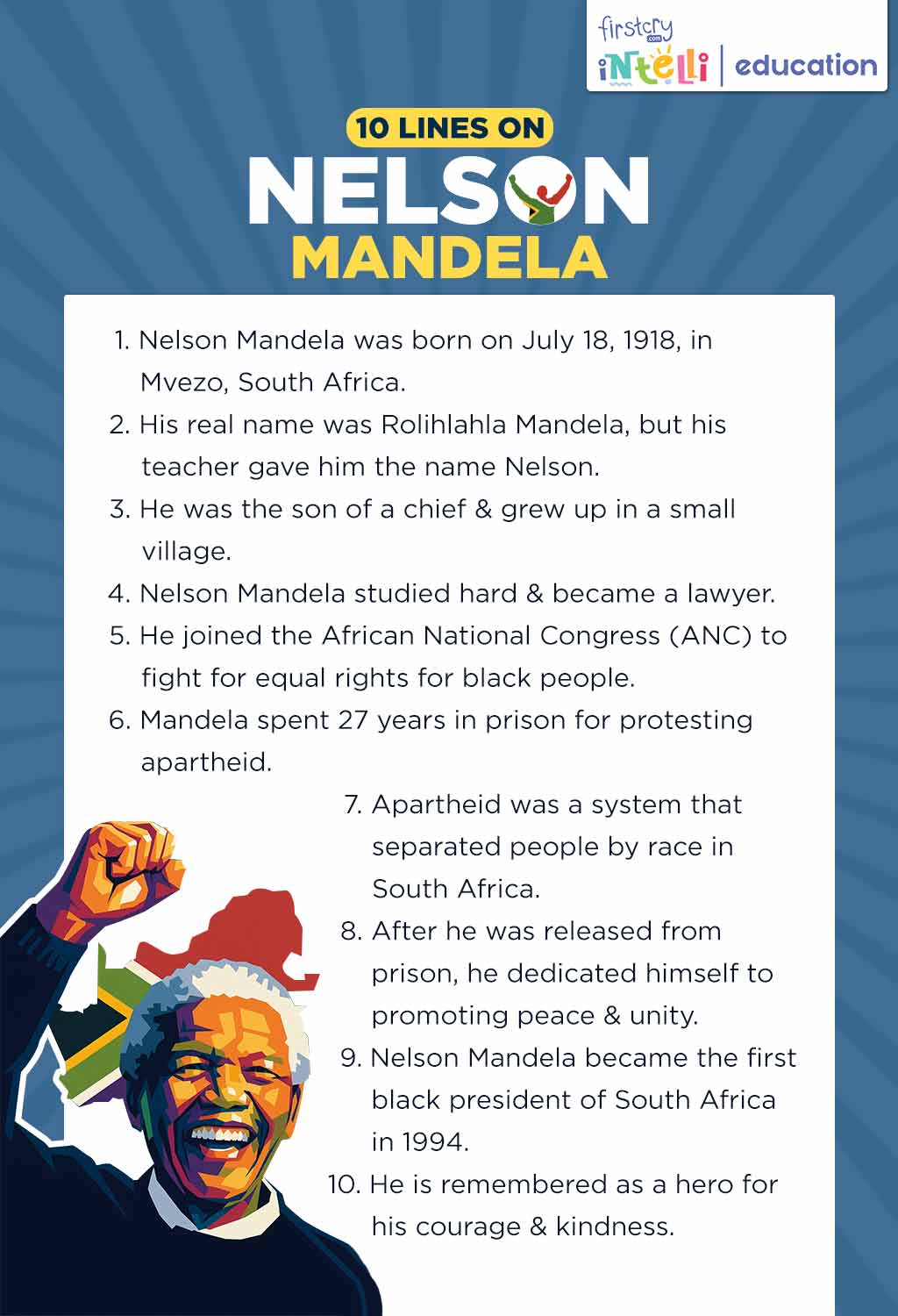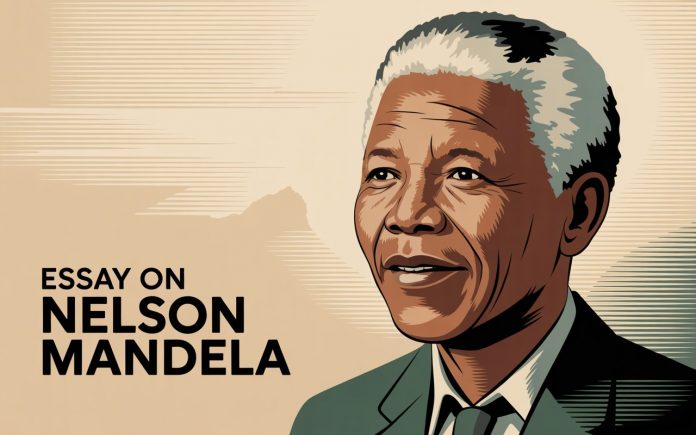Nelson Mandela is a globally admired figure whose life story inspires people of all ages. An essay on Nelson Mandela enables students to examine his courage, leadership, and dedication to equality and justice. Through his journey—from activist to prisoner and, finally, South Africa’s first black president—Mandela’s story highlights resilience, forgiveness, and the power of peaceful change.
Thank you for reading this post, don't forget to subscribe!
Writing a Nelson Mandela essay also helps children develop essential essay-writing skills. It encourages them to research, organise their thoughts, and express ideas clearly and logically. Whether writing a 10-line summary, a short paragraph, or a longer essay, students learn to structure their writing, use descriptive language, and convey meaningful messages. This topic supports young writers in building confidence while deepening their understanding of history and values.
By exploring Mandela’s life and legacy, students not only discover a remarkable historical figure but also practise compelling storytelling and persuasive writing, making the Nelson Mandela essay a valuable and engaging exercise for all learners.
Points To Remember While Writing Essay on Nelson Mandela
When preparing a ‘Life of Nelson Mandela’ essay, it is essential to consider both the historical context and the personal qualities that made him an iconic leader. Here are some points to keep in mind:
- Start by explaining the background of apartheid in South Africa to provide context for Mandela’s story.
- Briefly describe his early life, education, and how he became involved in politics.
- Discuss his leadership within the African National Congress and the events leading to his imprisonment.
- Reflect on how Mandela remained resilient during his long years in prison.
- Mention his release, the end of apartheid, and his election as South Africa’s first black president.
- Highlight his commitment to democracy, equality, and reconciliation—key themes to focus on in a Nelson Mandela achievements essay.
- Use memorable quotes to illustrate Mandela’s vision and character.
- Consider his global influence and the inspiration he provided to people around the world.
- Think about what his legacy means today.
- Use clear and engaging language, and share your thoughts about his life and achievements.
10 Lines on Nelson Mandela
Learning about Nelson Mandela helps us understand the concept of courage and the fight for equality. If you are asked to write a short note on Nelson Mandela, these 10 simple lines are perfect for young students:
- Nelson Mandela was born on July 18, 1918, in Mvezo, South Africa.
- His real name was Rolihlahla Mandela, but his teacher gave him the name Nelson.
- He was the son of a chief and grew up in a small village.
- Nelson Mandela studied hard and became a lawyer.
- He joined the African National Congress (ANC) to fight for equal rights for black people.
- Mandela spent 27 years in prison for protesting apartheid.
- Apartheid was a system that separated people by race in South Africa.
- After he was released from prison, he dedicated himself to promoting peace and unity.
- Nelson Mandela became the first black president of South Africa in 1994.
- He is remembered as a hero for his courage and kindness.

Paragraph about Nelson Mandela
To help young students understand Nelson Mandela’s inspiring life, a Nelson Mandela short paragraph is a great way to summarise his story. Below is a simple paragraph about Nelson Mandela for children.
Nelson Mandela was a great leader from South Africa who fought for equality and justice. He was born in 1918 and became a lawyer to help people. Mandela spent 27 years in prison because he stood up against apartheid, a system that mistreated people based on their skin colour. After his release, he worked for peace and became the first black president of South Africa in 1994. Nelson Mandela is remembered for his courage and kindness and for bringing people together. He is an inspiration to everyone who believes in fairness and freedom. His life teaches us never to give up, even when things are difficult.
Short Essay On Nelson Mandela In 150 Words
Nelson Mandela’s life is a powerful example of courage and leadership for students everywhere. This short essay on Nelson Mandela, in 150 words, introduces his inspiring journey and enduring legacy:
Nelson Mandela, born on July 18, 1918, in South Africa, became one of the most respected leaders in history. As a young boy, he grew up in a small village and later pursued a career in law to help others. Mandela joined the African National Congress (ANC) to fight against apartheid, a system that separated people by race. Because of his activism, he was sent to prison for 27 years. Even in prison, Mandela never gave up hope or his belief in equality and justice. After his release in 1990, he worked tirelessly for peace and went on to become the first black president of South Africa in 1994. Mandela’s leadership played a crucial role in ending apartheid and uniting the people. He is remembered for his kindness, forgiveness, and dedication to making the world a fairer place. Nelson Mandela’s life teaches us to stand up for what is right and never to lose hope, no matter how complex the challenges may be.
Essay On Nelson Mandela in 200 Words
Exploring the life of Nelson Mandela through a Life of Nelson Mandela essay helps students appreciate his remarkable journey and enduring legacy. This essay on Nelson Mandela in 200 words offers a detailed look at his achievements and the values he stood for:
Nelson Mandela was born on July 18, 1918, in Mvezo, a small village in South Africa. His early years were shaped by traditional Thembu culture and the values of leadership and service. Mandela studied law at the University of Fort Hare and the University of Witwatersrand, becoming a lawyer to fight against injustice. He joined the African National Congress (ANC) in 1944, dedicating his life to ending apartheid, the system of racial segregation that oppressed black South Africans. Mandela’s activism led to his arrest in 1962, and he was sentenced to life imprisonment during the Rivonia Trial in 1964 for his role in anti-apartheid activities.
He spent 27 years in prison, mostly on Robben Island, where he became a global symbol of resistance and hope. Despite harsh conditions, Mandela never gave up his fight for equality. Released in 1990, he worked tirelessly for reconciliation and led negotiations to end apartheid. In 1994, Mandela became South Africa’s first black president, leading the country towards democracy and unity.
His presidency focused on healing divisions and promoting human rights. Mandela’s life teaches us the power of perseverance, forgiveness, and the importance of standing up for what is right. He remains an inspiration to millions worldwide.
Long Essay On Nelson Mandela
A long essay on Nelson Mandela offers a chance to explore his extraordinary life and lasting impact in detail. Writing an essay in 500 words allows students to cover his early years, struggles, achievements, and the valuable lessons he taught the world.
Nelson Mandela is celebrated as one of the greatest leaders of the 20th century, known for his unwavering commitment to justice, equality, and peace. His journey from a small South African village to becoming a global symbol of hope and reconciliation is both inspiring and instructive. In this essay, we will examine his early life and education, the challenges he faced, the awards he received, and the life lessons he imparted.
Early Life And Education
Nelson Rolihlahla Mandela was born on July 18, 1918, in Mvezo, a small village in the Eastern Cape of South Africa. His father was a Thembu chief, and his mother, Nonqaphi Nosekeni, instilled in him a sense of pride in his heritage. At age seven, Mandela became the first in his family to attend school, where his teacher gave him the English name Nelson. After his father’s death, Mandela was placed under the care of Jongintaba Dalindyebo, the regent of the Thembu people, who ensured he received a good education.
Mandela’s formal education continued at Clarkebury Boarding Institute and Healdtown, a Wesleyan secondary school, where he matriculated. He began his Bachelor of Arts at the University of Fort Hare but was expelled for joining a student protest. Determined, he later completed his BA through correspondence and studied law at the University of Witwatersrand in Johannesburg. Working as a law clerk, Mandela became increasingly aware of the injustices faced by black South Africans under apartheid.
Nelson Mandela’s Life Struggles
His struggle against apartheid shaped Mandela’s life, the system of racial segregation enforced by the South African government. He joined the African National Congress (ANC) in 1944 and soon became a leading figure in the anti-apartheid movement. Mandela helped establish the ANC Youth League, which mobilised young people to fight for equal rights.
His activism led to his arrest in 1962, and he was sentenced to life imprisonment in 1964 for his role in anti-apartheid activities. Mandela spent 27 years in prison, mostly on Robben Island, enduring harsh conditions and isolation. Despite this, he remained committed to justice and equality, becoming a global symbol of resistance and hope. Released in 1990, Mandela led negotiations to end apartheid and became South Africa’s first black president in 1994. His leadership was instrumental in facilitating a peaceful transition to democracy and fostering reconciliation.
Awards
Nelson Mandela received many awards for his contributions to peace and justice. Here are five significant honours:
1. Nobel Peace Prize (1993) : Awarded jointly to Mandela and F.W. de Klerk for ending apartheid and establishing a new democratic South Africa.
2. Bharat Ratna (1990) : India’s highest civilian honour for his fight against apartheid.
3. Presidential Medal of Freedom (2002) : The highest civilian award in the United States, presented for his leadership and commitment to freedom.
4. Order of Lenin (1990) : The Soviet Union’s highest decoration for his struggle against racial oppression.
5. Order of Canada (1998) : One of Canada’s highest honours for his impact on global human rights.
Life Lessons From Nelson Mandela
Mandela’s life teaches us the importance of perseverance, forgiveness, and standing up for what is right—even when it is difficult. He showed that forgiveness and empathy are powerful tools for healing and reconciliation. Mandela believed in the value of education and lifelong learning, and he encouraged people to respect others and value diversity.
His legacy reminds us that one person can make a difference. By following Mandela’s example, we can work towards a more just and compassionate society.
Nelson Mandela’s journey from a village boy to a global icon is genuinely inspiring. The awards he received reflect his extraordinary impact, and the lessons from his life—perseverance, forgiveness, and the pursuit of justice—remain relevant today.
What Can A Child Learn From Nelson Mandela Essay?
Reading or writing an essay about Nelson Mandela helps children understand important values and life lessons. Mandela’s inspiring story teaches young readers about courage, resilience, and the importance of standing up for what is right.
From Mandela’s life, children can learn never to give up, even when things seem difficult, and the value of patience and perseverance. They learn the importance of respecting others, listening to diverse opinions, and forgiving those who have wronged them. Mandela’s example shows that everyone’s story matters and that it is possible to overcome challenges with determination and hope.
Writing about Nelson Mandela also helps children develop their essay-writing skills. They learn how to organise their thoughts, express ideas clearly, and use real-life examples to support their arguments. Practising essay writing in this way encourages critical thinking and helps children become better communicators.
FAQs
1. How can children benefit from writing about Nelson Mandela?
Children can learn valuable life lessons about resilience, respect, and standing up for what is right. Writing about Mandela also helps improve essay writing skills, such as organising ideas, using examples, and expressing thoughts clearly.
2. What are some key life lessons from Nelson Mandela’s story?
Key lessons include the importance of perseverance, forgiveness, patience, and respecting others. Mandela’s life shows that positive change is possible with determination and hope.
3. Can writing about Nelson Mandela improve my essay writing skills?
Yes, writing about Nelson Mandela encourages you to research, organise your thoughts, and use real-life examples. This practice helps develop critical thinking and clear communication skills.
4. Why is it important to include personal reflections in a Nelson Mandela essay?
Personal reflections help you connect with the topic and express your own thoughts and feelings. This makes your essay more engaging and meaningful.
Nelson Mandela’s life and legacy offer powerful lessons in courage, resilience, and hope for people of all ages. Whether you write a short note, a paragraph, or a long essay, his story inspires us to stand up for justice and equality. By learning about Mandela, we not only honour his memory but also strengthen our own writing and thinking skills.
Also Read:
Essay on Albert Einstein
Essay on Mother Teresa for Children











